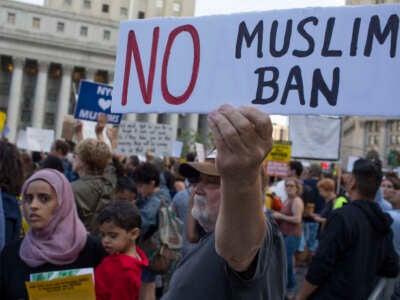During Donald Trump’s first term, the Afghan American community dodged a bullet. This time, we weren’t so lucky. The new “Muslim ban 2.0,” the successor to Trump’s original Muslim ban, went into effect today, with 12 countries on its list, including Afghanistan.
When President Trump began his second term in office on January 20, he issued an executive order asking for a 60-day review of vetting requirements for certain nationalities. As of 12 a.m. ET on June 9, Afghans are now barred from entering the U.S. This news comes as most of our community celebrates Eid-al-Adha and many Muslims around the world finish the annual Hajj pilgrimage to Mecca.
While some of this policy is framed as legal language in the name of “national security,” it is clear that this masking was done in an attempt to help the order pass challenges in the courts. Despite its narrow exception for Special Immigrant Visa holders, this policy is clearly a sweeping expression of racism and anti-Muslim prejudice.
The U.S.’s Role in Creating This Crisis
Afghanistan isn’t merely a Muslim country that happens to be a target of this administration’s ire. The U.S.’s role goes back to the 1970s, when the CIA covertly supported and armed the Afghan mujahideen fighting back against the Soviet invasion, part of a Cold War era-proxy war. This was followed by USAID-funded school textbooks in Dari and Pashto produced by the University of Nebraska that taught young Afghan students violence in refugee camps across Afghanistan and Pakistan. Years later, the U.S. invaded Afghanistan in the fall of 2001 in the wake of the September 11 attacks and fought a war against elements of al-Qaeda and the Taliban. During this 20-year war, the U.S. funded endemic corruption, backed notorious human rights violators and helped build an aid-reliant government that was essentially a house of cards. The war killed almost 180,000 people and culminated in bringing back a regime in 2021 that has instilled what many now call “gender apartheid.” Afghanistan today is the only country on the planet where women and girls are barred from education past the 6th grade.
This 40-year history means that the U.S. owes Afghans and Afghan Americans a huge debt. Instead of repaying this debt and undoing the harm it has caused over four decades, Muslim ban 2.0 has been yet another deep betrayal and abandonment.
First the U.S. bombed Afghans, then it abandoned Afghans. Now it has barred Afghans.
The decision to ban Afghans will mean that they will be left to fend off a regime that has targeted anyone that has stood alongside the U.S. for 20 years. That is not even to talk about the continued deportations of Afghans by the Pakistani and Iranian governments or the fact that Afghanistan is enduring a humanitarian crisis in which millions of people do not have access to more than one meal a day, a situation caused and exacerbated by U.S. sanctions policy.
How This Will Further Harm Afghan Refugees
According to recent estimates, this ban will impact almost 200,000 Afghans who had a pathway to refuge in the United States as well as 50,000 other Afghans in third countries, where they were encouraged to go by U.S. authorities in 2021 in order to make it to the U.S. This decision also is a de facto partnership with an awful regime that targets, detains, rapes, and extrajudicially kills Afghans, especially ones who are queer, women, or from other marginalized communities like Hazaras.
This ban is not unjust and painful. It is evil, crass, and racist.
This order will deeply impact those who have already arrived since 2021, fleeing the conditions in Afghanistan that made them seek safety here in the first place. Under Operation Allies Welcome, started by the Biden administration, at least 200,000 Afghans have sought safety across the country. They are pillars and leaders of their respective communities, from San Diego to small towns in Vermont. I’d often come across newly arrived Afghan families at major airports, on their anxious new journey to some city somewhere in the U.S. I’d say a quick “salaam,” or “peace be upon you” in Arabic, commonly used by Afghans, and wish them best of luck on their new life here, a journey they were forced to make by U.S. policy and did not choose. While displacement is horrible, there was the beautiful sight of an Afghan speaking my native tongue in random places anywhere I went. Allowing Afghans to seek safety and build a new home, to us, is a form of reparative policy for all the harm the U.S. has caused us over four long decades.
That all now comes to a grinding halt. Families will not be reunited, and people will die. It is guaranteed that others will be targeted, detained, and possibly deported. Afghan women and girls are disproportionately impacted by this new ban, due to the horrid conditions for them in Afghanistan. Some have already been deported under the Trump administration to third countries like Costa Rica or Panama. If an empire like the U.S. — whose power stretches around the world and which brags about being exceptional every day — does not want refugees, why won’t it stop waging wars and bombing countries like Afghanistan?
This ban is not unjust and painful. It is evil, crass, and racist. It serves no one, including veterans who’ve fought to reunite with the Afghans who bled alongside them or the Afghan Americans who are trying to bring back family and other loved ones.
Today is a grim day in U.S. history, and I question if we made the right choice in coming to seek safety in America in the first place. The truth, however, is that the entire world has turned its back on Afghan refugees — and nowhere is safe for us.
Keep the press free. Fight political repression.
Truthout urgently appeals for your support. Under pressure from an array of McCarthyist anti-speech tactics, independent journalists at Truthout face new and mounting political repression.
We rely on your support to publish journalism from the frontlines of political movements. In fact, we’re almost entirely funded by readers like you. Please contribute a tax-deductible gift at this critical moment!
Read full article at source
Stay informed about this story by subscribing to our regular Newsletter

